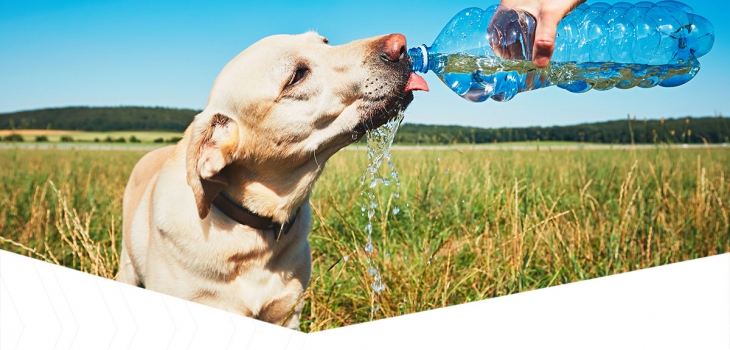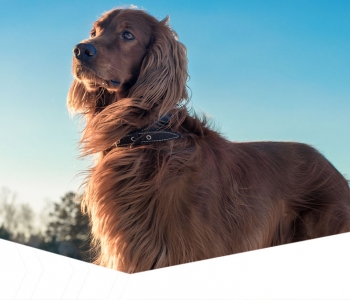
SUPPORTING DOGS TO LIVE A LONG AND HEALTHY LIFE
Some incredible work looking at the contributing factors to achieving healthy ageing and exceptional longevity¹ in dogs has been a focus for Eukanuba over the last 10+ years. In this newsletter experts including Dr Penny Watson from Queens Veterinary School at Cambridge University, Professor Stuart Carmichael from Fitzpatrick Oncology Centre, Professor Steve Dean former Chairman of the UK Kennel Club, Dr Vicki Adams and David Morgan highlight the similarities between dogs and humans in promoting healthy ageing.
EXCEPTIONAL LONGEVITY IN DOGS & ‘ESCAPING’ DISEASE
We live in a society with an ageing population; with nearly one in five people in the UK who will live to see their 100th birthday. Eukanuba has discovered that dogs are also achieving ‘exceptional longevity’ through a careful balance of nutrition, exercise, appropriate care and veterinary treatment.
Professor Steve Dean, Veterinary Surgeon and Former Chairman of the UK Kennel Club explains the similarities with the Eukanuba long life dogs and human centenarians: “The 11 dogs that reached exceptional longevity in the 10 year Longevity observation have demonstrated what we see in human centenarians – they have managed to compress into their last few years of life all those diseases that would typically have affected them as younger dogs. We can consider these dogs as “escapers” in that they have somehow escaped serious disease as a younger animal, or that they are able to cope with the disease in a better way.”
Professor Stuart Carmichael, Managing Director at Fitzpatrick Referrals in London and Professor of Veterinary Science at the University of Surrey, talks of how certain diseases are often considered as being age related rather than considering the disease independently. He said “it’s important to separate ageing from disease because as you get older you have a higher risk of disease due to the ageing of your immune system and organ systems, but ageing and disease are not the same. If you use dementia as an example, in the past we thought that dementia was normal human ageing which impacted badly on research into how to deal with it. It’s only when you get someone with early onset dementia you realise that this is a disease, it isn’t just people getting old. And yes it’s commoner in older people but it is not normal ageing. Essentially, it isn’t just about living for a long time; it’s about the quality of life as well. Dog owners want more than a dog that lives for 16 or 17 years, but a dog that lives for 16 or 17 years with a high quality of life. It’s an important mind set to get into. We’re not just talking about living longer; we’re talking about living healthy.”
BODY CONDITION AND OBESITY
The number of overweight and obese pets continues to rise in the UK, with almost 45% of pets treated by vets considered to be overweight². Excess weight increases the risk of conditions such as osteoarthritis, hypertension, diabetes and cancer, and can also significantly reducing life expectancy.
According to recent research by Wellcome Trust, the Medical Research Council and the Dogs Trust, Labradors are more likely to become obese than other breeds partly because a gene, important in controlling how the brain recognises hunger and the feeling of being full after eating, is thought to be affected. Dr Giles Yeo, a human geneticist from the University of Cambridge said “What we have found is that some Labradors get fat because they have a deletion in a gene within their brain and this particular gene plays a role in sensing how much fat they have in their body – so some Labradors don’t know how much fat they have and so keep eating to try to get fatter.”
The parallels between canine and human obesity can also be considered as part of a healthy lifestyle. For example, we know it’s important to get regular exercise and eat a healthy and high quality diet; the same applies for dogs to allow them to maintain an ideal weight and body condition. There are some moments in a dog’s life when weight gain becomes more common, such as later in life or after neutering so we should keep these moments in mind and change feeding protocol to a lower energy diet specifically designed for older dogs to help prevent weight gain during a dogs ‘more mature’ years.
It is the responsibility of pet owners to keep their dogs as close to an ideal body weight and condition as possible to maintain good health into old age. This requires more than high quality nutrition, as Dr Vicki Adams, Veterinary Epidemiology Consultant explains: “For dog owners, it’s down to them to give their pet good nutrition. This means the right kind of food in the right quantity, appropriate for their life stage and life style i.e. how active or inactive their dog is. What’s more, we need to provide regular exercise to keep that lean body mass as long as we can, as this is vital to giving a dog a long, healthy and happy lifestyle.”
NUTRITION
Nutrition plays a key role in helping dogs alleviate symptoms related to conditions such as diabetes and intestinal issues or control weight gain from being less active. By assessing a dog’s wellbeing we are able to prescribe a diet rich in key ingredients and nutrients such as vitamin E to support strong natural defences enabling pet owners to enjoy more time with their dog.
Eukanuba’s longevity council collectively agreed that the secret to healthy ageing in canines is a careful balance of nutrition, good husbandry and effective veterinary care. David Morgan comments on the longevity observation: “The ultimate goal of the Eukanuba Long Life Observation is to give owners the best advice on how they can care for their dogs so that they achieve what we call healthy longevity. There are so many variables involved in ageing; we wanted to make sure that we gave the dogs a consistent and high level of exercise, husbandry and care, allowing us to really focus the results of the observation on learning about healthy ageing.”
Similarly to people, the secret to having a healthy dog is maintaining a healthy weight and lifestyle. Of course we mustn’t forget about genetics as they play an important role but it’s important to realise that we as breeders and pet owners really can make a huge difference with diet, exercise, appropriate care and good veterinary care.
¹ Exceptional longevity is defined as living +30% longer than the breed´s typical life span
² PFMA Pet Obesity: Five Years On





